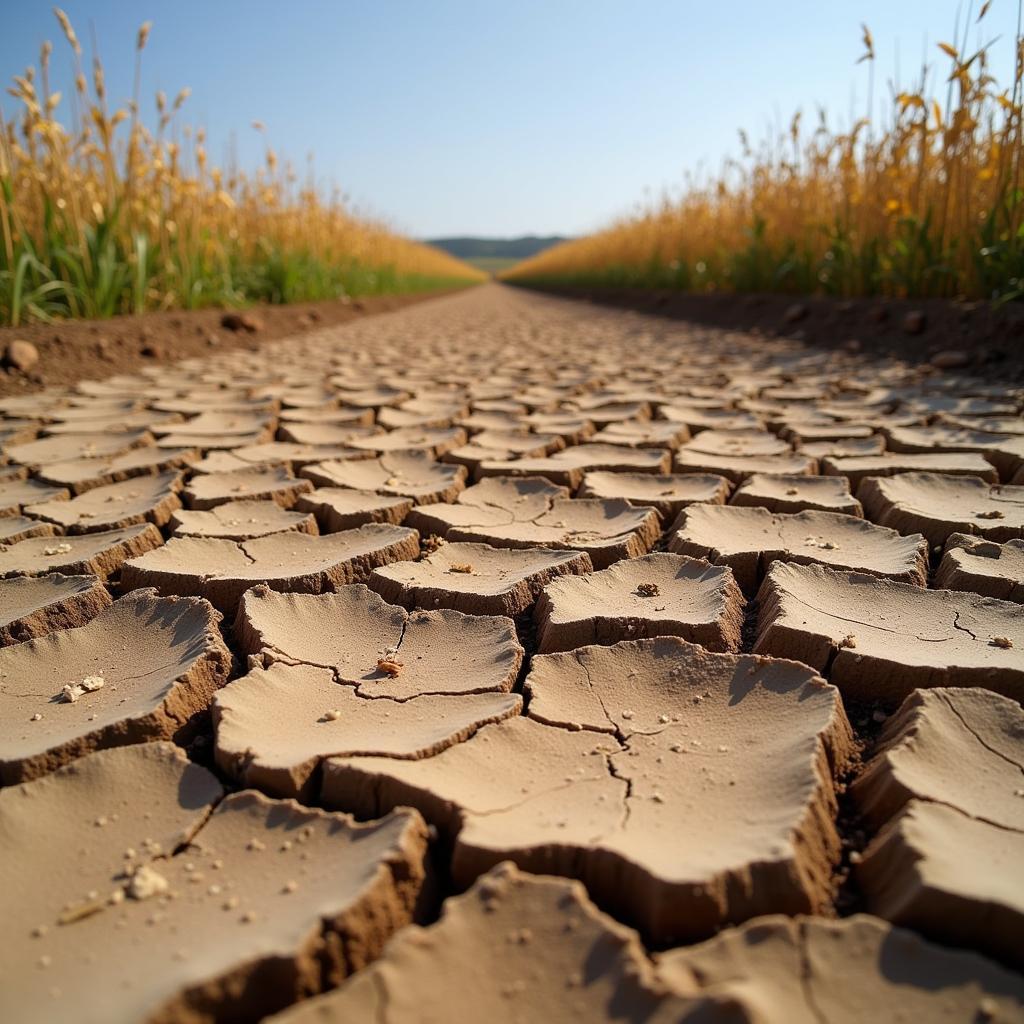Climate change and its impact on food production is a recurring theme in IELTS Writing Task 2, appearing approximately once every 3-4 months in actual tests. This frequency makes it a crucial topic for IELTS candidates to master. Based on historical data from climate change’s effects on global food production, this topic has maintained consistent relevance in recent years.

Exam Question Analysis
Some people believe that climate change will severely affect global food production in the future. To what extent do you agree or disagree with this statement? Give reasons for your answer and include relevant examples from your knowledge or experience.
This question requires candidates to express their opinion about the relationship between climate change and future food production, supported by relevant examples and explanations. Similar to How does globalization impact ecosystems and climate change, this topic demands a comprehensive understanding of environmental issues.
Sample Essay 1 (Band 8.5)
Climate change undoubtedly poses a significant threat to global food production, and I strongly agree that its impacts will be severe in the coming decades. This essay will explore the main reasons behind this perspective and provide relevant examples to support this position.
Firstly, rising temperatures and changing precipitation patterns directly affect crop yields and agricultural productivity. For instance, in India, where agriculture depends heavily on monsoon rains, irregular rainfall patterns have already led to significant crop failures in recent years. These changes, as discussed in Climate change impacts on food security?, have resulted in reduced rice and wheat production, staple foods for millions.
Secondly, extreme weather events, which are becoming more frequent due to climate change, can devastate agricultural regions. The unprecedented floods in Pakistan in 2022 destroyed millions of acres of farmland, while prolonged droughts in California have severely impacted fruit and vegetable production. These events demonstrate the vulnerability of our food systems to climate-related disasters.
Furthermore, rising sea levels threaten coastal agricultural areas through saltwater intrusion and soil degradation. In Bangladesh, for example, many fertile coastal regions have become unsuitable for traditional rice cultivation due to increased soil salinity. This situation mirrors the concerns highlighted in The impact of climate change on global weather patterns.
In conclusion, the evidence strongly suggests that climate change will have devastating effects on global food production. Unless immediate action is taken to address climate change, we face a future of increased food insecurity and potential agricultural crises.
Sample Essay 2 (Band 6.5)
I agree that climate change will affect food production in the future. There are several reasons why this is true.
First, climate change makes the weather very unpredictable. When farmers cannot predict the weather, they cannot grow crops properly. For example, in my country, many farmers lost their crops because of unusual rain patterns last year.
Second, global warming causes problems like floods and droughts. These natural disasters destroy farms and kill animals. In 2021, many farms in China were damaged by floods, and this caused food prices to increase.
Also, some places will become too hot for growing certain types of food. This means farmers must change what they grow or find new places to farm. This is expensive and difficult for poor farmers.
However, some scientists are working on new types of crops that can survive in bad weather. As mentioned in should genetically modified crops be used to solve food scarcity, these developments might help solve some problems.
In conclusion, I believe climate change will cause serious problems for food production, but new technology might help solve some issues.
Band Score Analysis
Band 8.5 Essay Analysis
- Task Response: Clear position with fully developed ideas
- Coherence and Cohesion: Logical organization with effective paragraphing
- Lexical Resource: Sophisticated vocabulary with natural usage
- Grammatical Range: Complex structures used accurately
Band 6.5 Essay Analysis
- Task Response: Clear position but less developed support
- Coherence and Cohesion: Basic organization with some progression
- Lexical Resource: Adequate vocabulary with some errors
- Grammatical Range: Mix of simple and complex structures
Key Vocabulary
- precipitation patterns (n.) /prɪˌsɪpɪˈteɪʃən ˈpætərnz/ – rainfall distribution
- agricultural productivity (n.) /ˌæɡrɪˈkʌltʃərəl ˌprɒdʌkˈtɪvɪti/ – farming output
- saltwater intrusion (n.) /ˈsɔːltwɔːtər ɪnˈtruːʒən/ – seawater entering freshwater systems
- soil degradation (n.) /sɔɪl ˌdeɡrəˈdeɪʃən/ – deterioration of soil quality
- food insecurity (n.) /fuːd ˌɪnsɪˈkjʊərəti/ – unreliable access to food
Conclusion
Climate change’s impact on food production remains a crucial IELTS Writing Task 2 topic. Practice writing essays about related themes such as sustainable agriculture, food security solutions, and agricultural technology adaptation. Share your practice essays in the comments for feedback and improvement suggestions.